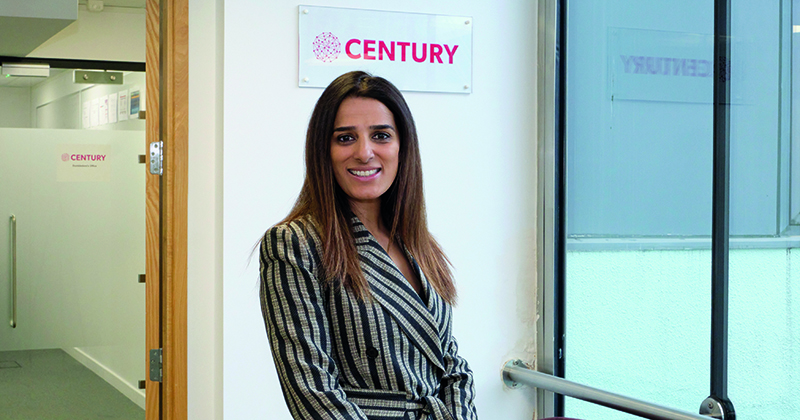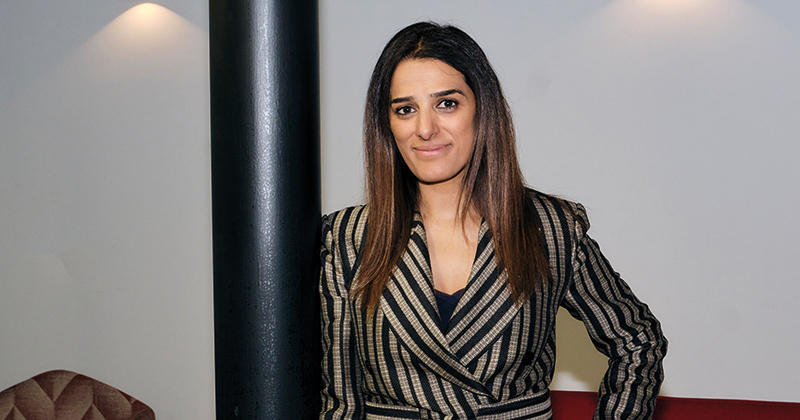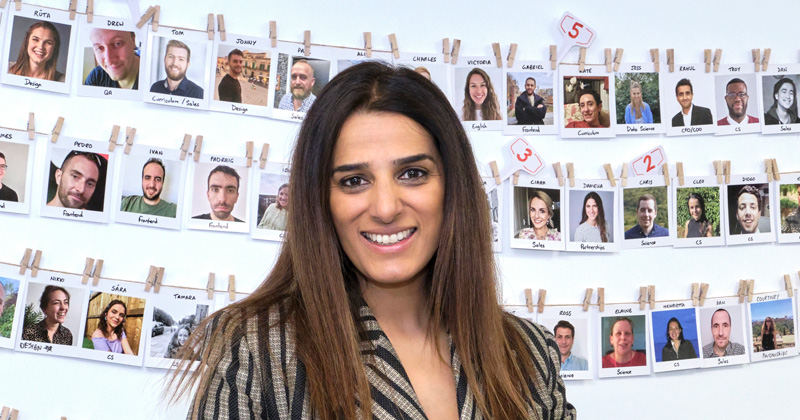Priya Lakhani, founder of one of the world’s biggest AI EdTech companies, is at pains to express how many of her glowing achievements have been driven by a strong moral conviction to make the world a better place.
This is important for her, not only because she sits on the government’s AI Council and her social enterprise, Century, is now the largest provider of online maths, English and functional skills programmes in colleges in the country. But also because she is defending herself from detractors who say “cruel” and “horrible” things about her.
At one investor meeting, a fellow EdTech entrepreneur held up on stage a picture of Elizabeth Holmes – the American founder of Theranos facing 11 years in jail for fraud related to the failed blood-testing company – and said, “This is the AI in EdTech in the UK”.
Lakhani says the jibe was “really awful and very hurtful”, because “everyone knows” that Century, a personalised teaching and learning platform which has been used by over 1.2 million students in 55 countries, is “the big AI company not just in the UK, but Europe…and frankly the US. How dare they do that? That’s a defamation case, isn’t it?”
Lakhani would know the answer better than most: in a former life, the philanthropist-entrepreneur was a barrister specialising in media law. I cautiously tread the line between objective journalism and not wanting to offend Lakhani.
In some ways this is easy, because she is instantly likeable. Her door sign at Century’s London office, where Lakhani has been making “pancake cakes” (like pancakes but spongey) for her staff, reads “Dumbledore’s office”. Like Harry Potter’s headmaster, Lakhani is clearly a wise and morally steadfast education leader. Unlike him, her thoughts tumble out at 100 miles an hour, and I struggle to get a word in edgeways.

Autism controversy
One reason Lakhani has attracted such vitriol is her controversial claim two years ago that her AI can predict, with 96 per cent accuracy, whether a child is autistic. Industry experts promptly called for verifiable evidence.
Lakhani says the technology tracks student behaviour, and this correlates with demographic data from information management systems indicating whether a student has special needs.
“With autism, it was overwhelming, the patterns that we saw,” she says.
A tool able to diagnose autism would be the holy grail for some EdTech investors, with the potential to make billions. But Lakhani cautions that her AI is “not a diagnostic” tool. And she is refusing to give in to pressure to publish Century’s “commercially sensitive” studies on the matter.
“We are an EdTech company, we put the ed before the tech…I have learned from the experts who know what they’re talking about that this [technology] is not an appropriate way to diagnose autism.”
Lakhani would “love to” work with an autism charity and academics to publish a “full study” on the autism issue, but this is “just a matter of timing and people and resources” and is not a priority for the moment.
For now, Lakhani’s focus is “getting the technology in front of as many students as possible, improving outcomes, reducing teacher workload and to personalise as much as we can”.
Relentless drive
Century’s journey has been shaped by Lakhani’s formidable work ethic, which has been a constant theme of her life. At school, Lakhani was told by certain teachers she would “never be a lawyer” because she was “brown and female”. She worked through every lunch hour to prove them wrong.
While other law students had two or three work placements, she had 20 and “no holidays through university”.
When she married, Lakhani chose to make her own iced version of Nigella Lawson’s chocolate fudge cake for her 600 guests, the day before the wedding.
How much of this boundless energy could be down to her own ADHD? Lakhani only discovered she had ADHD in her thirties and is “quite happy” not to have been diagnosed earlier “because maybe the label would have affected me negatively, maybe not”.

Inspired by Hancock
The fact that Lakhani’s AI platform is prompting controversy is ironic, given that the inspiration behind her concept was sparked by a politician who has courted more controversy than almost any other in recent years – Matt Hancock.
By 2012, Lakhani had quit law and built up the country’s first fresh ethnic sauce company, Masala Masala, based on her mum’s traditional recipe. The social enterprise provided over three million meals and thousands of vaccines to the underprivileged in India and Africa and funded several schools there.
Lakhani was appointed as an advisor by Vince Cable, the then business secretary, on his Entrepreneurs’ Forum, alongside Dragon’s Den’s Julie Meyer and James Caan. Lakhani recalls Hancock, then a joint minister between the education and business departments, stating during a meeting that “20 per cent of our nation can’t read, write or do maths well enough to get a good job at the end of formal education, and this is a problem that we need to solve”.
While Hancock never got a chance to solve that particular problem, it was a “real wake up moment” for Lakhani.
She recalls thinking, “oh my goodness. I’ve just spent four years funding schools in Commonwealth countries that all replicate the British model, which doesn’t work for 20 per cent of our kids. What’s going on?”

The turn of the Century
Lakhani wound up her involvement with Masala Masala and turned her sights to education.
She set up meetings with leaders from the “most challenged” schools as well as the “top of the league table independent” schools, and discovered that while “every school” and “every teacher was different”, they used the same “one size fits all delivery”.
“Teachers were complaining, poor things…They were showing me all this marking and assessing they were doing which looked just like when I was at school. They were frazzled with all this work,” she says.
Lakhani turned to AI, which she knew something about from her experience as a BBC current affairs commentator.
Lakhani took several ‘nanodegree’ online AI courses and became “completely hooked”.
She was the victim of a “very violent robbery” 13 years ago in which she was beaten with a brick, and in order to overcome the severe post-traumatic stress disorder she experienced, Lakhani set out to read “every medical journal related to PTSD written since the Vietnam War to explain what was happening in my brain”.
“Because of that, I learned a lot about neuroscience. If it hadn’t happened, I doubt Century would exist today,” she says.
Building an AI company is not easy for those without Silicon Valley credentials, and Lakhani was initially “laughed out the door by every venture capitalist” because she was “not a former Google engineer”.
She was told “you don’t look like an AI entrepreneur”, with one investor asking her: “Sweetheart, can you explain what AI is to me?”
But Lakhani convinced enough backers to believe in her. Century has raised £22 million in investment, and Lakhani claims it no longer requires further rounds and is now “on the path to break even”.
Despite now being 10 years old, it is still classed as a “small” company and does not have to file audited accounts (meaning it meets two of the three thresholds: a turnover of £10.2 million or less, £5.1 million or less on its balance sheet, or fewer than 50 employees).
Annual accounts show Century has posted a £16.5 million loss since it was founded – £3.3 million of that was in 2021-22. Lakhani says this shows the invested money being spent. But she also gives the impression throughout our conversation that her overriding objective is to improve education, rather than make as much money as possible.

Journey into FE
After achieving success in schools, Lakhani decided there was “not enough love” for FE and Century began investing through match funding in devising assessments and personalised learning plans to help students resitting their maths and English GCSEs.
An initial evaluation of six colleges showed spending ten minutes a week on the platform led to twice the national progress results. It has since been adopted by 74 per cent of colleges, and Century’s AI is being used by partners including BPP Law School, Oxford University Press, Pearson and Bond.
Century’s initial assessment tests, which adapt questions based on how previous questions were answered, are also used by independent training providers for apprenticeships.
Philosophical debates
Century’s global expansion is continuing at pace. It has partnered with the Canadian online learning company D2L to host its K-12 curriculum on Century’s platform and last month launched in the US. There are plans to launch six other partnerships over the next six months.
Lakhani is also currently advising the chancellor on reviewing AI regulations.
She describes with relish the “incredible” debates her 120 staff of engineers, data scientists, teachers, neuroscientists and educational psychologists, get into.
“Lots of philosophy and ethics! And that’s great, because we didn’t build Century for any other reason than we wanted to try and improve education…there are 120 people here who will stand by that purpose.”
Twitter unkindness
She still faces detractors. Most disturbingly, one created a fake account for Lakhani on Twitter, “perfectly curated” to attract over 200 education-influencer followers. At a time when “a fair few ministers across different countries” were seeking to adopt Century’s technology, the impersonated account tweeted ministers, calling them “really horrible words” that Lakhani declines to repeat.
Indeed, the ruse was so authentic that she was messaged by a DfE official asking her to stop tweeting.
Lakhani believes such underhand tactics are not unusual in the business world but is “shocked and surprised” it happens in education.
“I’m just trying to mind my own business, just trying to solve a couple of problems in education and the amount of vitriol I have received…is extraordinary,” she says.
It is one reason why she is now writing a book on disinformation and fake news – her third, following one on why the current education system is failing and a sci-fi children’s story.
Lakhani would never allow her own two children to be “unkind”.
But then there are those “extraordinarily kind” people in the education sector, including ASCL’s general secretary Geoff Barton and Jonnie Noakes, director of teaching and learning at Eton College, who “keep [her] going”.
“When I meet them, it just reminds me of why I’m doing what I’m doing. Sometimes I need that reminder. People think entrepreneurs are just so resilient, but actually it does take the community.”









Your thoughts